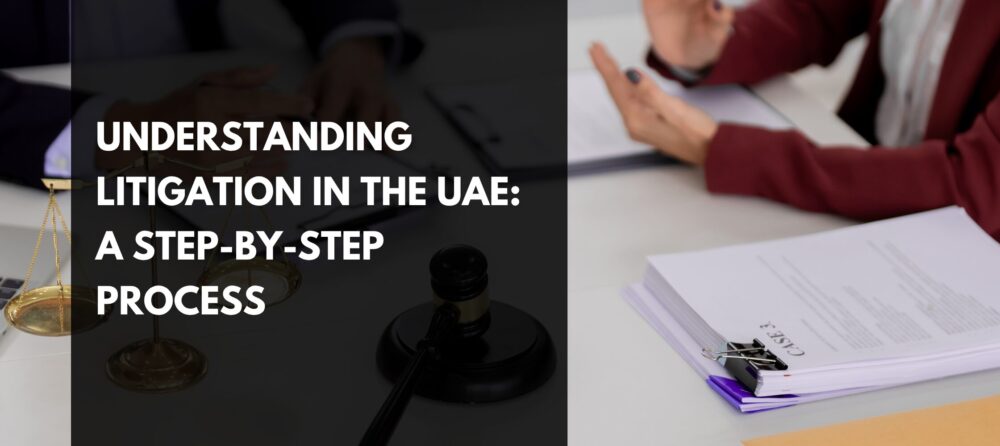
Litigation in the UAE can be a complex process, especially for businesses or individuals unfamiliar with the legal system. The UAE operates under a civil law system, which differs from common law systems in places like the UK. Whether you are involved in a commercial dispute, a civil case, or any other form of litigation, understanding the steps involved is crucial for navigating the legal landscape.
In this article, we’ll break down the litigation process in the UAE, explaining each step in detail to help you understand what to expect when pursuing or defending a legal claim.

What is Litigation?
Litigation refers to the process of resolving disputes through the court system. It involves legal proceedings where one party files a case against another, and the dispute is decided by a judge. In the UAE, litigation can involve various types of cases, including commercial disputes, property claims, personal injury cases, labor issues, and more.
Step-by-Step Guide to Litigation in the UAE
Litigation in the UAE involves several key stages. Understanding these stages is essential for both parties to the case to ensure they are adequately prepared for the legal process.
1. Pre-Litigation Stage
Before filing a lawsuit, it is often advisable to try and resolve the issue through negotiation or mediation. In many cases, parties may engage in discussions to see if they can come to a mutual agreement without going to court. If this approach fails, the next step is to formally initiate litigation.
Key Actions:
- Send a Legal Notice: The claimant (plaintiff) typically sends a formal demand letter or legal notice to the opposing party, outlining the claim and seeking a resolution.
- Negotiation or Mediation: Before proceeding to court, many disputes are resolved through alternative dispute resolution (ADR) methods, especially in commercial cases.
2. Filing a Lawsuit
Once attempts to resolve the dispute outside of court have failed, the next step is to file a lawsuit. In the UAE, lawsuits must be filed with the appropriate court depending on the nature of the case. This could be a civil court, commercial court, or labor court, among others.
Key Actions:
- Prepare the Claim: The claimant must prepare a statement of claim that outlines the nature of the dispute, the evidence supporting the case, and the remedy sought.
- Submit to Court: The claim is then submitted to the court of first instance, which will review the documents and schedule a hearing.
- Court Fees: A fee is typically required to file a lawsuit, which is calculated based on the value of the claim.
3. Court Procedures
Once the lawsuit is filed, the court will follow a set process to resolve the case. This includes hearings, evidence submission, and exchange of pleadings or memoranda from both parties.
Key Actions:
- First Hearing: During the first hearing, the court will examine the claim and listen to the arguments of both parties. The defendant has the opportunity to respond to the claim and present their defense.
- Evidence Submission: Both parties will be required to submit evidence supporting their claims or defense. This may include documentary and testimonial pieces of evidence.
Witness Testimony: If necessary, the court may call on witnesses to testify.
4. Court Judgment
After reviewing all the evidence and hearing the arguments from both sides, the court will issue a judgment—dismissing or granting the claim of the claimant.
Key Actions:
- Court Decision: The court will issue a decision based on the laws and pieces of evidence submitted by the parties.
Appeals Process: If either party is dissatisfied with the judgment, they may appeal the decision of the lower court to a the higher court. The appeal process will involve a review of the case.
5. Enforcement of Judgment
If the judgment be comes final and executory, the next step is to enforce the court’s decision. This process ensures that the losing party complies with the judgment, whether that involves paying damages or fulfilling contractual obligations.
Key Actions:
- Execution of Judgment: The winning party can request the court to take action to enforce the judgment, such as attachment of asset and/ or garnishment.
Legal Support: The assistance of a lawyer is essential in this stage, as they will work with the court to ensure the judgment is enforced effectively.
Why Choose Professional Legal Representation in the UAE?
Litigation in the UAE can be a complex and time-consuming process. Navigating the local court system, understanding the legal nuances, and ensuring compliance with all regulations requires expert legal guidance. Professional legal representation is essential for anyone involved in litigation to ensure that their rights are protected and that they achieve the best possible outcome.
At Al Adly & Co., our team of experienced litigation lawyers is here to guide you through every step of the litigation process, from filing a lawsuit to enforcing a court judgment. We are committed to providing our clients with expert legal advice, clear communication, and effective solutions to complex legal issues.
